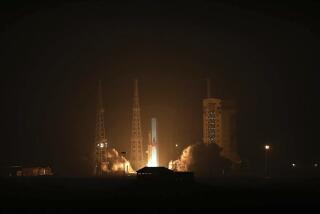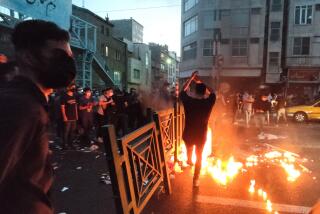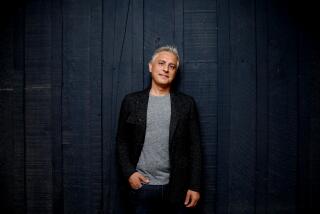Iran’s Anger Over a New Map Magnifies a Perception Gulf
- Share via
TEHRAN — They were just two small words, a parenthetical aside on a National Geographic map.
But that’s all it took to get fiercely proud Iranians to rise up this week against what they saw as an attack on their history.
In its latest world atlas, National Geographic added “Arabian Gulf” in parentheses beneath “Persian Gulf” to label the body of water that cuts along the coasts of Iran and its Arab neighbors.
The use of Arabian Gulf, and the implication that Iran may somehow be losing its historical claims to dominance of the ancient seas, pierced the cultural pride that pervades the land once known as Persia. It gave fresh life to the long and often bloody tensions between Iranians and Arabs, and added fuel to a widely held Iranian suspicion that Arabs have been quietly lobbying for years to change the name of the Gulf.
The Islamic Republic swiftly banned the National Geographic Society from selling its publications here or sending journalists into the country.
“Under the influence of the U.S. Zionist lobby and the oil dollars of certain Arab governments, the society has distorted an undeniable historical reality,” wrote Hassan Hanizadeh in Tehran Times, a leading daily newspaper. “The society owes the Iranian nation an apology for distorting historical realities and using the unacceptable ‘Arab Gulf’ instead of the beautiful and historical name of the Persian Gulf.”
So keen was the perceived slight that it brought a fleeting unity to Iran’s far-flung political spectrum. From the left to the right to the disaffected, Iranians rallied against the offending American magazine. They blamed the “Zionists,” accused the Arabs and lambasted the Americans.
“Distortion,” “Discreditable,” and “Politically Motivated,” cried the headlines.
“The Arabs think that because they’re rich they can buy anything, even names,” said Mahbubeh Tabatabei, a 30-year-old woman who wandered in a sleepy shopping center in Tehran, window shopping with her mother and sister. “Even the way they walk, they think they own everything.”
Al Jazeera, the Arab satellite television channel whose headquarters are in Qatar, on the other side of the Gulf from Iran, played an animated cartoon to poke fun of Iranian ire. In it, an Iranian mullah is oblivious to regional strife but furious over the name of the Gulf.
Iran responded by threatening to restrict Al Jazeera’s work along with the National Geographic ban.
“I was shocked and disappointed to see such a prestigious network acting so unprofessionally and falling into a Zionist trap,” said Abdollah Nasseri, an official with the Islamic Republic News Agency.
“There is no doubt that it is a Zionist conspiracy to sow discord among the Muslims, and it is unfortunate that some fallen Arab capitalists have also fallen into the same trap.”
Even some computer techies sympathetic to Iran were stirred to action, and pulled off a “Google bomb,” successfully manipulating the search engine to obtain a high ranking. When computer users type “Arabian Gulf” in the Google search field, the first link is to the arabian-gulf.info website, which says, “The Gulf you are looking for does not exist. Try Persian Gulf.”
Tehran’s Shahr Cultural Center hastily announced a contest called “Persian Gulf Forever,” and requested paintings and slogans inspired by Iran and the Persian Gulf “in response to the use of unacceptable alternative names.”
“The competition is being organized as a protest and to inform the National Geographic Society of the Iranian nation’s dissatisfaction with the move,” an article in Tehran Times said.
The Minister of Culture and Islamic Guidance urged Iranian filmmakers to bolster their homeland’s image by learning about their heritage and producing films showcasing Iranian history.
“We need to seriously defend our Iranian identity,” said Ahmad Masjed-Jamei , according to Iranian news reports. “We should not allow the faking of history as well as names for Iranian areas.”
Iran also was miffed -- though considerably less so -- because the atlas also referred to the disputed islands of Abu Musa and Greater and Lesser Tunb, claimed by the United Arab Emirates, as being “occupied by Iran.”
National Geographic has remained unapologetic. The publication recognizes “Persian Gulf” as the primary name, but “we want people searching for ‘Arabian Gulf’ to be able to find what they’re looking for and not confuse it with the nearby Arabian Sea,” said a statement by Allen Carroll, chief cartographer, on the National Geographic website.
Iranians may have felt isolated during the 25 years since the Islamic revolution, but they are also raised on proud tales of a glorious past when Persia was a superpower and one of the world’s great civilizations.
The Persian Gulf figures prominently in that collective memory.
“Before Islam, all these countries belonged to the Persian empire,” said Sayed Mustafa Taj-Zadeh, an advisor to Iranian President Mohammad Khatami. “Therefore, when the Persian Gulf is changed to another name, it doesn’t matter what ideology you belong to, it’s insulting.”
In the early, idealistic days of the Islamic revolution, he recalled, the young revolutionaries considered changing the name to “Islamic Gulf” in a bid to forge friendships with their Arab neighbors. But the idea was discarded.
“Our pride has kept us going for thousands of years,” he said. “For Iranians, prestige is very important.”
More to Read
Sign up for Essential California
The most important California stories and recommendations in your inbox every morning.
You may occasionally receive promotional content from the Los Angeles Times.










